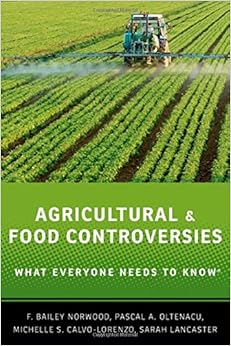Weekend reading: Agricultural & Food Controversies
F. Bailey Norwood, Pascal A. Oltenacu, Michelle S. Calvo-Lorenzo, and Sarah Lancaster. Agricultural & Food Controversies: What Everyone Needs to Know. Oxford University Press, 2015.

This book purports to take an objective look at “why equally smart and kind people can form vastly different opinions about food.”
Good luck with “objective.”
These authors are professors in agriculture departments in state universities (Oklahoma and Florida) who wish that controversial subjects in food and agriculture could be explored “while paying respect to the character and intellect of both sides.”
But then they take on liberals.
Liberals, they say, “have a negative view of big business, and…comprise the majority of food activists, and you have a story that can explain the rise of many agricultural controversies.”
With this established, they take on issues such as pesticides, fertilizers, carbon footprints, GMOs, farm subsidies, local food, and animal welfare.
Although the authors seem to be struggling to be fair to the positions of “liberal activists,” they tend to judge those positions as overly simplistic.
In the view of this liberal activist (I prefer advocate, however), this book ends up reflecting the authors’ strong ties to—and defense of—industrial agricultural models.
This is a good place to start to understand the non-liberal activist perspective.

